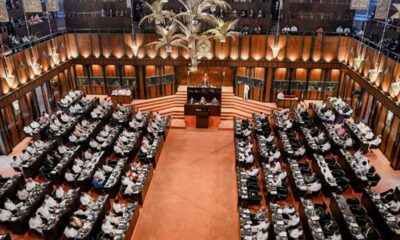FEATURES
Nupur Sharma controversy; Will India maintain a silent approach to the issue as they did for other issues?
Published
3 years agoon
By
editor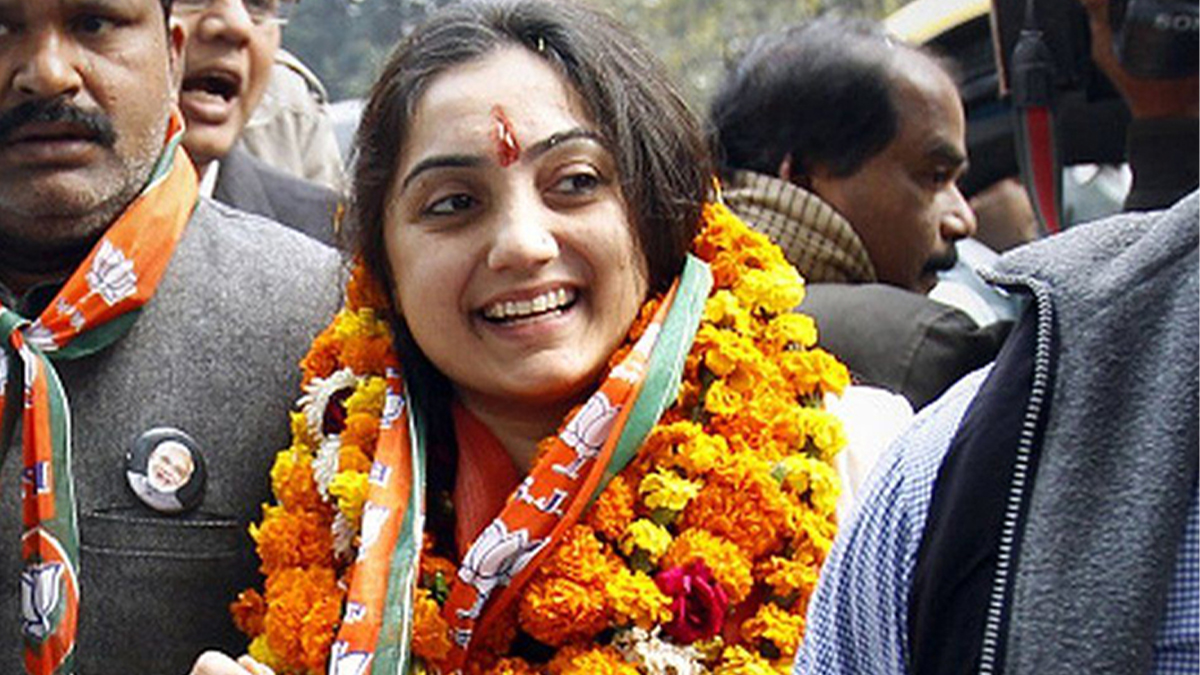
India’s governing Bharatiya Janata Party (BJP) has been within the limelight again ever since a party’s leading active leader allegedly made controversial remarks about Prophet Mohammad throughout a TV debate.
The provocative remarks made by BJP’s Nupur Sharma has additionally created an uproar within the Arab world. Adding fuel to fire one other saffron occasion another BJP chief Naveen Jindal allegedly made remarks on Prophet Muhammad.
With the growing opposition within the country itself and further in regional and Arab countries over the controversial remarks, the BJP had to suspend Nupur Sharma and Naveen Jindal from the first membership of the party, which is the one and only major step taken by Prime Minister Modi’s party against them ever since the controversial made by Sharma on May 28 throughout a TV debate.
And also, BJP additionally distanced itself from the controversy and issued a press release “strongly condemning” the insult to any non-secular particular person of any faith and underlined the fitting of each citizen to observe any faith of their selection.
In a letter to Nupur Sharma, the BJP’s Central Disciplinary Committee said that she has expressed opposite views on the occasion’s place on numerous issues, and therefore, she has been suspended from the occasion with speedy impact.
After Nupur Sharma was suspended she unconditionally withdrew the remarks that she had made on Prophet Muhammad.
Nupur stated in a press release that ‘Mahadev’ is being insulted and insulted constantly for the final number of days. “It was being jokingly stated that it was not a ‘Shivling’ however a fountain. The (Gyanvapi) Shivling was even in comparison with roadside indicators and sticks in Delhi,” he stated.
“I couldn’t bear this fixed insult and disrespect in the direction of my Mahadev and I stated a few issues in response to it. If my phrases have harmed anybody’s non-secular sentiments or harm anybody’s non-secular sentiments, I’ll without Situation withdraw my assertion. It was by no means my intention. To harm anybody’s non-secular sentiments,” Sharma stated in her apology.
A case was registered against Nupur on May 28 for making objectionable remarks following a complaint lodged by Irfan Sheikh, joint secretary of Raza Academy, an Islamist group based in Maharashtra.
Nupur was charged under Indian Penal Code (IPC) sections 295A (deliberate and malicious acts intended to outrage religious feelings of any class by insulting its religion or religious beliefs), 153A (promoting enmity between groups) and 505(2) (statements conducing to public mischief), police had said.
The protests were sparked in many parts of India including Uttar Pradesh, West Bengal and Kanpur areas over the remarks.
Meanwhile, Nupur and her family were provided security by the Delhi Police today after she filed a complaint for allegedly being harassed and getting death threats.
When a case against Sharma was taken up at India’s Supreme Court, the Court criticised Nupur Sharma for her remarks about the Prophet Muhammad, declaring that her “loose tongue” had “put the entire country on fire,” and requiring her to make an instant public apology.
“She actually has a loose tongue and has made all kinds of irresponsible statements on TV and set the entire country on fire. Yet, she claims to be a lawyer of 10 years standing… She should have immediately apologised for her comments to the whole country,” the court said.
Modi’s government’s lethargy approach to settle the issue will eventually damage India’s ties with the Arab world and Iran.
The UAE, Oman, Indonesia, Iraq, the Maldives, Jordan, Libya and Bahrain have joined with a few other Muslim nations to condemn the remarks. Kuwait, Iran and Qatar had called Indian ambassadors to register their protest while Saudi Arabia had issued a strongly worded statement.
Although the Indian diplomats were trying to placate these countries but no signs of ending the crisis.
“Allowing such Islamophobic remarks to continue without punishment, constitutes a grave danger to the protection of human rights and may lead to further prejudice and marginalisation, which will create a cycle of violence and hate,” Qatar’s ministry of foreign affairs said.
“The Ministry of Foreign Affairs expressed its condemnation and denunciation of the statements made by the spokeswoman of the BJP,” Saudi Arabia said.
The 57-member Organisation of the Islamic Conference (OIC) and Pakistan have also criticised India. But the Delhi government criticised both, saying their comments were “unwarranted and narrow-minded”.
India’s ambassador to Qatar, Deepak Mittal, said the remarks from some fringe elements did not represent the views of the Indian government. However, Qatar said it expected a public apology from India.
However, analysts say that BJP is not taking the matter seriously because the party’s response may not be enough to stop the growing opposition to Modi’s government. The party and the government should make responsible public statements on the issue without giving a ‘just’ statement over the issue, analysts say.
In another aspect, the BJP government’s lethargy approach to solving the crisis will also risk having an unstable situation in the region due to the presence of the Muslim population in these countries mainly in the South Asian countries. Already the Maldives had condemned the remarks and Pakistan strongly criticised the remarks.
Although the Muslim community in some of the major countries in the Asian region have not publicly shown their opposition to the controversial remarks, the time is not too far to come out them considering the growing global opposition against India’s silence over the issue.
At a time when the Islamic State of Iraq and Syria’s (ISIS) was trying to gain its lost ground as well as to spread its ideology, issues like the Nupur Sharma controversy will help such groups to re-emerge their lost image.
Using such issues, terrorist organisations ability to win the hearts of frustrated Muslims, especially the youth from varied socio-demographic backgrounds has only posed a major threat to international security as well as regional security. Although in India, ISIS has failed to make any meaningful entry, letting growing opposition to the issue will open new entry into India.
In a latest development, a suicide bomber from ISIS, detained in Russia was given the sole task of killing Nupur Sharma, Indian media recently reported quoting top intelligence sources. That was one of the outcomes of the issue.
Analysts say that hate speech and attacks against Muslims have risen since the BJP came to power in 2014. In this background, Sharma’s comments reflect the deep religious polarisation that the country has been witnessing over the past few years.
You may like
-


Forests on state lands to be designated as reserves
-
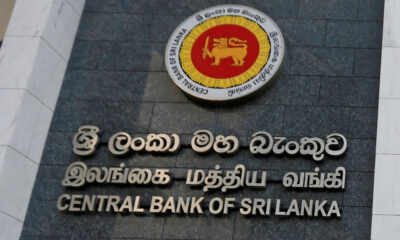

No cases filed against 22 banned pyramid schemes – CBSL
-
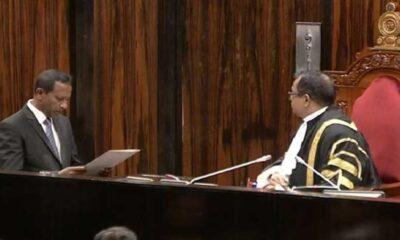

NPP’s Nishantha Jayaweera sworn in as MP
-


Train operations disrupted on main line
-


Suspects arrested over Kandana & Ragama shootings
-


Railways propose SMS alerts to prevent elephant-train collisions
FEATURES
Will JVP/NPP leaders respond to this, while dabbling on populist politics?
Published
2 days agoon
July 7, 2025By
editor
Half this year 2025 has also been spent with no answer to how Sri Lanka would begin settling its restructured foreign debts and interests on them, from year 2028 August. When President Wickramasinghe led government began discussing its foreign debt restructuring with the IMF framed within IMF conditions, Sri Lanka had amassed a massive USD 56,092.95 million by end third quarter 2024, the time we were tied to presidential election campaigns.
The last quarter with parliament elections also slotted in, the new President Anura Kumara Dissanayake (AKD), sworn in late September last year, had no time to intervene in the economy. Thus the fourth quarter of the year 2024, the first 03 months of President AKD’s rule closed in December with foreign debt increasing to USD 57,133.49 million. An increase of USD 1,040.54 million in 03 months. Sri Lanka had by then agreed with IMF to restructure USD 12.55 billion of its total debts.
According to the IMF agreement signed by President AKD’s NPP government, Sri Lanka has to begin repayments from 2028 August. That would be under AKD’s NPP rule.
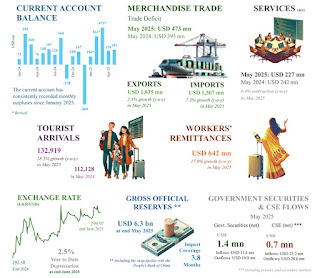
Meanwhile Sri Lanka has to settle this year 2025, a total of USD 2,454 million in routine debts including USD 1,085 million as interest, according to Deputy Minister of Economic Development, Anil Jayantha. That, excluding the annual foreign trade deficit the GoSL has to settle every year.
In year ending December 2024, the total foreign trade deficit was USD 6,100 million with an import bill of USD 18,841 million, an increase of 12.1 percent over the previous year, despite fuel imports decreasing. This year 2025, the trade deficit in month of May was USD 473 million, according to the CBSL figures published. This was an increase of 16.9 percent over previous year trade deficit in month of May.
We are in the midst of a two year Middle East armed conflict, that may drag on, even if it does not lead to a cease fire between Israel, Iran and the Hamas armed organisation in Palestine. Uncertainties looming in Middle East may not provide the dollar remittances from migrant labour the government estimated for this whole year and received during the past 05 months. Thus, GoSL may have to face a serious increase in the external trade deficit, if a miracle does not make a change. Assumed the increase would be around 10 percent over the previous year 2024, the external trade deficit may reach or even go beyond USD 6,710 million. To this, has to be added the annual routine debt of USD 2,454 million disclosed by Deputy Minister Jayantha in parliament, to have the total commitment of the GoSL for year 2025. That then would be USD 9,164 million in 2025.
As much as the NPP government, the SJB in Opposition is inefficient and intellectually timid too in responding to governance issues. Thus there is no serious, intellectual debate in how the government could earn the extra USD 9,164 million needed to bridge the trade deficit this 2025. The IMF has no proposal for increased exports to fetch extra dollars. They are only focussed on axing State expenses and increasing “Rupee income” with increased taxing. The IMF thus approved import of luxury vehicles as a source of Rupee income from taxes, wholly ignoring the fact, GoSL would have to burn a heavy load of hard earned dollars including remittances from migrant labour. From January this year till beginning of month of May, Sri Lanka had spent USD 200 million for vehicle imports, according to CBSL Governor Dr. Nandalal Weerasinghe. He told media on 22 May, the total value of Letters of Credit opened by then for vehicle imports was USD 450 million. And the NPP government seems happy with a tax collection of Rs.136 billion by end of April.
Now, what is important? Collecting 136 billion rupees, form spending USD 200 million for vehicles, that would need extra dollars for extra consumption of fuel, with greater traffic congestions on urban roads? Fact remains, the IMF has no programme, no proposal to increase the export and service income despite all tax concessions, privileges and State patronage for FDIs and for tourism development given by the State at the expense of the tax payer. The annual gap between import trade cost and the export trade income remains around USD 7,000 to 8,000 million with another USD 2,000 million required for debt servicing.
This should be stressed without ambiguity. The required extra annual income in many millions of dollars cannot be earned with Ministers reducing numbers in their vehicle fleet, from not taking residency in official bungalows, from reducing State expenses in patches, from Ministers stepping into paddy fields carrying a mammoty, or by indicting few officials and politicians of the previous regime.
We need a well designed national development plan that can guarantee annual increase in dollar exports to bridge a trade deficit of about USD 10,000 million. Will the JVP/NPP leadership tell the People what their plan is for such income earning, while going round with their populist propaganda stuff?
– Kusal Perera
FEATURES
Asweddumized fields and sizzling kottu roti: New words from Sri Lanka
Published
2 weeks agoon
June 26, 2025By
editor
In a letter dated 7 October 1971 and sent from Panadura, Ceylon, OED contributor Pearl Cooray wrote to then Chief Editor Robert Burchfield: ‘I have looked up references for the word asweddumize and have succeeded to a certain extent. The Sinhala word aswedduma means “land recently converted into a paddy field”, and the Anglicized word asweddumize means to prepare a field for sowing paddy’. Cooray was a Sri Lankan academic who visited Burchfield in Oxford earlier in 1971, and upon returning to her country and her position in the Dictionary Department of the University of Ceylon, briefly corresponded with the OED, sending the above quoted letter as well as a selection of Sri Lankan newspapers and magazines for the reading programme for the OED Supplements that were in preparation at the time. Her suggestion for asweddumize would have been too late for the word to be considered for Volume I of the Supplements, so Burchfield wrote the word and definition on a paper slip, the main means by which words were tracked until the 2010s, and filed it alongside an earlier slip from July 1970 with the same suggestion from another Sri Lankan contributor, D. N. Ponnamperuma.
Nothing further is found about asweddumize in the OED’s files until 1986, when botanist D. J. Mabberley, a regular consultant for the Supplement, sent in a quotation slip for the word, which he would have encountered during the time he spent at a university in Sri Lanka. A decade later, another slip records the decision made not to draft an entry for asweddumize due to lack of evidence. ‘Omit (sadly)’was the responsible editor’s regretful note on the slip.
Almost thirty years later, this sad omission has finally been rectified, with the addition of asweddumize to the OED as part of this update. Current OED Sri Lankan English consultant Rochana Jayasinghe’s research on Pearl Cooray and her contributions to the Supplement helped put asweddumize back on the OED’s radar, and now that the dictionary’s editors have wider access to historical and contemporary Sri Lankan sources than their counterparts in the 1970s and 80s, it was possible to find sufficient evidence for the word, including a first quotation from as far back as 1857.
Joining asweddumize among this batch of new words are other borrowings from Sinhala, the Indo-Aryan language primarily spoken by the Sinhalese, the largest ethnic group in Sri Lanka. Mallung (first attested 1893) is lightly cooked, shredded (often leafy green) vegetables mixed with fresh grated coconut, chilli, and other spices, served as a side dish, salad, or condiment as part of a typical Sri Lankan meal, while kiribath (1886) is a Sri Lankan dish made with rice cooked in coconut milk and formed into a block, typically sliced into diamond-shaped pieces and served with various types of onion relish or sweetened with jaggery. Kiribath is traditionally eaten at special occasions such as Avurudu (1881), the first day of the Sinhala and Hindu New Year, occurring on the spring equinox (usually falling around 14 April), marked by a period of celebration typically lasting for seven to ten days.
Other Sri Lankan English words in this update originate both in Sinhala and another widely spoken language on the island, Tamil. Kottu roti (1991) is a Sri Lankan dish consisting of pieces of roti, meat, and vegetables, mixed with spices and curry sauce, and chopped by cleavers as they are cooked on a griddle. It is typically associated with the distinctive sound of the cleavers hitting the griddle as it is prepared by roadside vendors, and its name combines the Tamil word kottu ‘chopped’ with the Sinhala word roṭi ‘bread’. Partly a borrowing from Sinhala and partly a borrowing from Tamil, watalappam (1956) is a custard made from coconut milk (or sometimes condensed milk), cashew nuts, eggs, and spices such as cardamom and cloves, sweetened with jaggery and traditionally eaten by Sri Lankan Muslims during celebrations marking the end of Ramadan.
Sri Lankan music is represented by the words baila (1973) and papare (2006). Baila, a loan word from Portuguese, refers to an uptempo style of popular music originating in Sri Lanka which combines influences from both Africa and Europe, typically played in 6-8 time, with a syncopated rhythm, as well as to the style of dance performed to this music. Often associated with weddings and other celebrations, types of baila music are also popular in Goa and in the city of Mangaluru, on India’s west coast. Papare, on the other hand, is a genre of Sri Lankan music usually played at cricket and other sports matches, characterized by lively rhythms and typically featuring instrumentation of trumpet, saxophone, trombone, and snare and bass drums.
Apart from adding new Sri Lankan English words, OED editors have also revised a number of existing Sri Lankan English entries in the dictionary. Both these new and revised entries have been given transcriptions and audio pronunciations based on a new pronunciation model for Sri Lankan English, which is explained in more detail in this article. These enhancements to the OED’s coverage of Sri Lankan English help provide a more complete picture of how the language is used islandwide.
Full list of World English additions and revisions in the OED June 2025 update
(oed.com)
FEATURES
Dog-sized dinosaur that ran around feet of giants discovered
Published
2 weeks agoon
June 25, 2025By
editor
The full name of the new species is Enigmacursor mollyborthwickae dinosaur
A labrador-sized dinosaur was wrongly categorised when it was found and is actually a new species, scientists have discovered.
Its new name is Enigmacursor – meaning puzzling runner – and it lived about 150 million years ago, running around the feet of famous giants like the Stegosaurus.
It was originally classified as a Nanosaurus but scientists now conclude it is a different animal.
On Thursday it will become the first new dinosaur to go on display at the Natural History Museum (NHM) in London since 2014.
BBC News went behind the scenes to see the dinosaur before it will be revealed to the public.
The discovery promises to shed light on the evolutionary history that saw early small dinosaurs become very large and “bizarre” animals, according to Professor Paul Barrett, a palaeontologist at the museum.
When we visit, the designer of a special glass display case for the Enigmacursor is making last-minute checks.
The dinosaur’s new home is a balcony in the museum’s impressive Earth Hall. Below it is Steph the Stegosaurus who also lived in the Morrison Formation in the Western United States.
Enigmacursor is tiny by comparison. At 64 cm tall and 180 cm long it is about the height of a labrador, but with much bigger feet and a tail that was “probably longer than the rest of the dinosaur,” says Professor Susanna Maidment.

The Enigmacursor was a small dinosaur that lived alongside some of the biggest known
“It also had a relatively small head, so it was probably not the brightest,” she adds, adding that it was probably a teenager when it died.
With the fossilised remains of its bones in their hands, conservators Lu Allington-Jones and Kieran Miles expertly assemble the skeleton on to a metal frame.
“I don’t want to damage it at this stage before its revealed to everybody,” says Ms Allington-Jones, head of conservation.

Conservators Lu Allington-Jones and Kieran Miles assembled the dinosaur onto a frame for display
“Here you can see the solid dense hips showing you it was a fast-running dinosaur. But the front arms are much smaller and off the ground – perhaps it used them to shovel plants in its mouth with hands,” says Mr Miles.
It was clues in the bones that led scientists at NHM to conclude the creature was a new species.
“When we’re trying to identify if something is a new species, we’re looking for small differences with all of the other closely-related dinosaurs. The leg bones are really important in this one,” says Prof Maidment, holding the right hind limb of the Enigmacursor.
When the dinosaur was donated to the museum it was named Nanosaurus, like many other small dinosaurs named since the 1870s.
But the scientists suspected that categorisation was false.
To find out more, they travelled to the United States with scans of the skeleton and detailed photographs to see the original Nanosaurus that is considered the archtype specimen.
“But it didn’t have any bones. It’s just a rock with some impressions of bone in it. It could be any number of dinosaurs,” Professor Maidment said.

Susanna Maidment travelled to the US to look at the original Nanosaurus dinosaur
In contrast, the NHM’s specimen was a sophisticated and near-to-complete skeleton with unique features including its leg bones.
Untangling this mystery around the names and categorisation is essential, the palaeontologists say.
“It’s absolutely foundational to our work to understand how many species we actually have. If we’ve got that wrong, everything else falls apart,” says Prof Maidment.
The scientists have now formally erased the whole category of Nanosaurus.
They believe that other small dinosaur specimens from this period are probably also distinct species.
The discovery should help the scientists understand the diversity of dinosaurs in the Late Jurassic period.
Smaller dinosaurs are “very close to the origins of the large groups of dinosaurs that become much more prominent later on,” says Prof Barrett.
“Specimens like this help fill in some of those gaps in our knowledge, showing us how those changes occur gradually over time,” he adds.
Looking at these early creatures helps them identify “the pressures that finally led to the evolution of their more bizarre, gigantic descendants,” says Prof Barrett.

The fossilised remains are the most complete of any in the world for early small dinosaurs
The scientists are excited to have such a rare complete skeleton of a small dinosaur.
Traditionally, big dinosaur bones have been the biggest prize, so there has been less interest in digging out smaller fossils.
“When you’re looking for those very big dinosaurs, sometimes it’s easy to overlook the smaller ones living alongside them. But now I hope people will keep their eyes close to the ground looking for these little ones,” says Prof Barrett.
The findings about Enigmacursor mollyborthwickae are published in the journal Royal Society Open Science.
– Georgina Rannard
Science correspondent
(BBC News)

Forests on state lands to be designated as reserves

No cases filed against 22 banned pyramid schemes – CBSL














